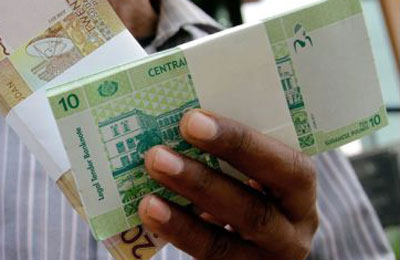
Sudan devalues currency by 22.6pc
Khartoum, November 12, 2013
Sudan's central bank has devalued the Sudanese pound by 22.6 percent against the dollar, the second such move in little over a year as the African country struggles with hard currency shortages.
Sudan's economy has been in turmoil since South Sudan's secession in 2011 took away of three-quarters of oil production. Oil was the driver of the economy and source for dollars needed for food and other essential imports.
Sudan produces too little to feed its around 32 million people.
Bidding prices for the pound were stated as 5.6871 for one dollar, compared with 4.4 previously, central bank data on Reuters terminals showed on Monday. Ask prices were 5.7155. In 2011, the official rate was around 3.
The central bank has been trying to bridge a ballooning gap with the black market rate where one dollar costs 7.8 pounds as import firms struggle to get their hand on hard currency. The black market rate has become the benchmark for banks and firms.
The rate is watched by foreign firms such as cellphone operators Zain and MTN and by Gulf banks who sell products in pounds and then struggle to convert profits into dollars. Gulf investors also hold pound-denominated Islamic bonds sold by the central bank.
A central bank official, asking not to be named, said the rate had been already changed in September when the government cut fuel subsides. He did not elaborate.
The secretive central bank tends not to announce devaluations, which are embarrassing for the government, which denies there is a shortage of hard currency.
The new exchange rate was shown for the first time on Reuters terminals on Monday. On Sunday it was still the old rate of 4.4, historic data showed. The central bank website carried the new rate on Monday.
Sudan has sought to offset the loss of southern oil reserves by boosting gold sales, which make up almost 70 percent of exports. But a recent sharp fall of the global gold prices means 2013 revenues will be well below last year's $2.2 billion.
In September the government lifted most fuel subsidies to help overcome a budget crisis. The scarcity of dollars had then become so bad that the central bank had started using up the general reserves of commercial banks, which are meant to be kept as deposits with the central bank, a financial source told Reuters recently.
Sudan avoided the "Arab Spring" that unseated rulers in nearby Egypt but soaring inflation has sparked small protests against President Omar Hassan al-Bashir, in power since 1989. - Reuters







